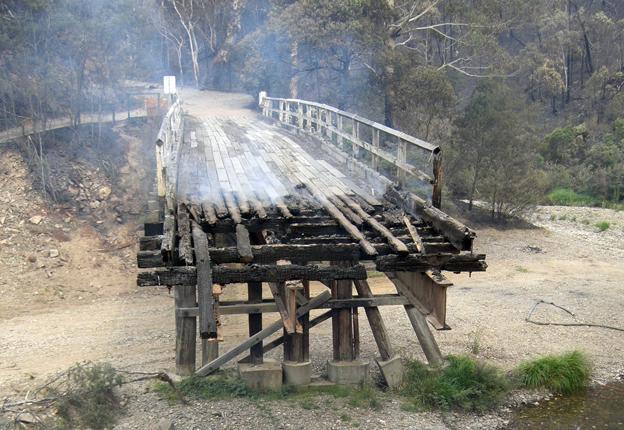
PUBLICATIONS
Published works

Measuring the social, environmental and economic consequences of bridge failure due to natural disasters
| Title | Measuring the social, environmental and economic consequences of bridge failure due to natural disasters |
| Publication Type | Thesis |
| Year of Publication | 2020 |
| Authors | Gajanayake, A |
| Academic Department | School of Engineering |
| Degree | Doctor of Philosophy |
| Number of Pages | 250 |
| Date Published | 01/2020 |
| University | RMIT University |
| City | Melbourne |
| Keywords | Bridge reconstruction, Disaster management, Infrastructure Engineering and Asset Management, Infrastructure failure, Post-disaster decision making, socio-economic impacts, Sustainability assessment |
| Abstract | With an increase in the frequency and intensity of natural disasters in recent times, the vulnerability of infrastructure assets to such events is a major concern for governments and communities worldwide. The last decade has seen an increase in the number of hydro-meteorological disasters, which have caused major social, economic and environmental impacts on the regions affected. Road bridges tend to be one of the most vulnerable infrastructure assets to hydro-meteorological events, as they are designed to cross water-ways and are built across the natural flow of water. As bridges play a vital role in the recovery of a community after a disaster by providing access to the disaster zone, the reconstruction of damaged bridges is a significant aspect of post-disaster recovery. The prioritisation and reconstruction of bridges tend to be carried out based on financial and engineering assessments, with very limited focus on the wider social, environmental and economic impacts of the decisions made. This thesis argues that a holistic approach in assessing and prioritising bridge reconstruction will increase the sustainability and resilience of the wider infrastructure system. The ensuing research project, part of the Bushfire and Natural Hazards Cooperative Research Centre, has explored the importance of a more holistic approach to assessing post-disaster reconstruction impacts and has developed a framework that could be followed by academics and practitioners for this purpose. The research used a mixed-methods approach; it relied on both quantitative and qualitative data in a single study. As one of the main objectives of the PhD was developing a framework that could be used to assess wider impacts, an iterative process was adopted, which helped in continuously improving the framework with the new knowledge that was gathered throughout the course of the candidature. The review of literature revealed that the majority of post-disaster assessments and subsequent decision-making processes tend to pay less attention to the wider social, environmental and economic impacts of road infrastructure failure. The literature that incorporated wider aspects tends to be focussed on specific impact categories, with none of the studies capturing a comprehensive set of impacts. The literature review also provided the opportunity to analyse the different techniques used by scholars to assess wider impacts, in order to select the most appropriate techniques for the purpose of the study. Potential end-users of the framework were interviewed to understand how decision making in relation to post-disaster infrastructure reconstruction takes place in a practical sense. The interviews helped the researcher to identify how decision making could be optimised in a resource and time constrained post-disaster setting. The practical requirements of the decision makers were considered to develop a more suitable framework, thus increasing its potential adoption among road reconstruction authorities. The developed framework was applied to a real life disaster situation - a flood - in which two bridges were damaged, and the resulting social, environmental and economic impacts were assessed. As part of the research project, a toolkit based on the framework was developed in order to carry out this assessment. To the best of the author's knowledge, this was the first instance where a comprehensive set of sustainability related impacts of the failure of rural road bridges were assessed. Results showed that the total sustainability related impacts vary based on where the bridge is located, and impacts could range between 25-30% of the total impacts. The framework and toolkit were validated through a series of interviews with practitioners and academics working in the areas of infrastructure reconstruction and sustainability. The interviews helped in refining the toolkit to better suit practical applications, without compromising the required theoretical and academic rigour. The reliability of the results obtained through its application in the case studies was tested with a follow-up questionnaire survey to residents in the area and interviews with decision makers working in the region. A further sensitivity analysis of the results was conducted in order to understand how changes in the input values and external variables affect the results. It was found that the socio-economic impacts could be reduced significantly by allowing restricted volumes of traffic to use a bridge rather than being completely closed off during the reconstruction period. A Cost-Benefit Analysis using the developed toolkit could be performed to identify the optimal intervention techniques. The outcomes of this PhD research can be used by both academics and practitioners in assessing the wider socio-economic and environmental consequences of road infrastructure damage. The toolkit developed through this research is planned to be further modified for use by disaster management and road agencies through a CRC Utilisation Project. The outcomes of this thesis can thus be used by infrastructure engineers to optimise their decision making processes, thereby driving increased sustainability of infrastructure systems and resilience to future disaster events. |
| URL | https://researchrepository.rmit.edu.au/esploro/outputs/doctoral/Measuring-the-social-environmental-and-economic-consequences-of-bridge-failure-due-to-natural-disasters/9921892204801341#details |
Published Works


